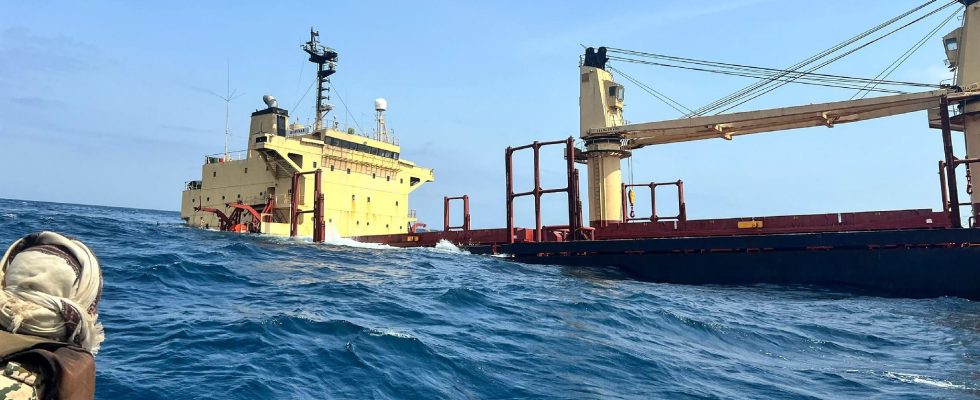The economic effects of attacks on ships in the Red Sea are so far “moderate”. This is what the WTO’s chief economist, Ralph Ossa, told AFP. “I think at the moment the macroeconomic impact seems moderate, which is because demand in Europe is relatively low and shipping capacity is sufficient,” he said.
But the harmful effects of the attacks regularly carried out by the Houthi rebels since November are already being felt in other areas. Firstly on the environment. THE Rubymar, a cargo ship loaded with fertilizer which sank in the Gulf of Aden after being damaged by Houthi missiles, presents a risk to the environment, the American army warned on Saturday March 2. The rebels claimed responsibility for the February 19 attack on the Belize-flagged merchant ship operated by a Lebanese company, Blue Feet. Yemen’s government said Saturday that the ship had sunk.
The risk of an “environmental catastrophe”
Information immediately confirmed by the United States Central Command (CENTCOM). “The approximately 21,000 tonnes of ammonium phosphate sulfate fertilizer that the ship was carrying pose an environmental risk in the Red Sea,” he said in a statement. “By sinking, the vessel also poses a subsurface impact risk to other vessels navigating the waterway’s busy shipping routes,” CENTCOM added.
Several other organizations have also expressed concern about the environmental threat posed by this tanker. Satellite images shared by Maxar Technologies and published by AFP show fuel oil escaping from the ship. According to the site TankerTrackers, the sinking “would cause an environmental catastrophe in (Yemeni) territorial waters and in the Red Sea.” According to the maritime security agency UKMTO, run by the British Navy, the attacked ship was 35 nautical miles (65 kilometers) from the Yemeni port of Mokha, in southwest Yemen.
Furthermore, as spotted International mailsatellite images of the ship published by CENTCOM show an “oil slick” extending over around thirty kilometers, specifies The Orient-The Day. Questioned by the Lebanese daily, Roy Khoury, CEO of Blue Fleet, affirmed that agricultural fertilizers from Rubymar “do not present any danger”. However, the day after the attack, the Djibouti Ports and Free Zones Authority described the cargo as “very dangerous”. In a post published on the social network reported by the Wall Street Journal, Yemeni Prime Minister Ahmed Bin Mubarak, head of the government at war against the Houthis, estimated that the ecological disaster caused by this shipwreck constitutes “a threat to the lives of our people and generations to come”.
Container transport in free fall
The Houthi rebels say they are targeting ships in the Red Sea and the Gulf of Aden that they consider linked to Israel, in “solidarity” with the Palestinians in the Gaza Strip, in the grip of the war between the Israeli army and the Palestinian Islamist movement Hamas. Their attacks have forced many shipowners to suspend passage through this zone where 12% of world trade passes.
In response, the United States, which supports Israel, set up a multinational maritime protection force in the Red Sea in December 2023 and launched, with the help of the United Kingdom, strikes in Yemen against the Houthis. The latter have since expanded their attacks to vessels linked to the United States or the United Kingdom. Container shipping across the Red Sea has fallen by almost a third this year due to Houthi attacks, according to the International Monetary Fund (IMF).
Damaged submarine cables
These also cause damage in the depths. According to information from Israeli financial daily Globes, taken over by The Jerusalem Post, four submarine cables were reportedly damaged by these Yemeni rebels. The damage to these four major cables, which connect regions of Europe, Asia and Africa, has triggered cuts and slowdowns in Internet speed since February 24, particularly felt in India, specifies Release. These attacks are believed to have taken place somewhere between the Saudi city of Jeddah and the state of Djibouti, in East Africa. The two coasts are particularly close in places, notably in the Bab-el-Mandeb Strait, which is only 27 kilometers wide at its narrowest point.
As recalled the site Numerama, this strait is a key crossing point for a number of submarine cables linking Europe to India and, more generally, to the rest of Asia. Part of them also benefits Israel indirectly, through connection points in the Gulf of Aqaba, in the far south of Israel. According to the Submarine website Cable Map, which offers a map of all submarine cables in the world, 17 connections cross the Bab-el-Mandeb Strait. “Yemen is at a critical point for these cables,” noted the American institute Gulf International Forum on January 29.
While submarines capable of sabotaging cables at the bottom of the seas do not appear to be part of the military means available to the Houthis, specifies NumeramaHowever, these Yemeni rebels have other important capabilities. Thus, according to the Gulf International Forum, fighters, who “have undergone combat diver training”, “could use a similar method of attack and have an arsenal of naval mines to damage the cables”. According to the Gulf Security Forum, the cables were preserved “more due to the relative technological underdevelopment of the Houthis than due to lack of motivation.” Until when ?
